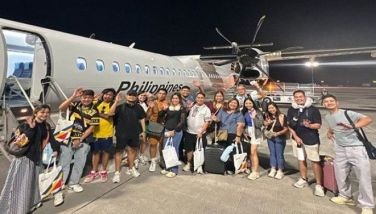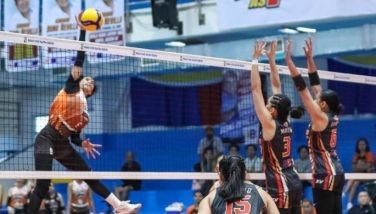Legal exports
In a lecture hosted by the Foundation for Liberty and Prosperity regarding the practice by foreigners of professions in the Philippines, your four centavos batted for greater regulatory clarity in respect of allowing foreigners to practice their craft in the country. The problem is most acute in the legal profession. In arguing for opening up the latter to foreigners, several points were raised including the country’s treaty obligations under the General Agreement on Trade in Services (GATS) of the World Trade Organization and the Asean Framework on Trade in Services. Moreover, the experiences of our Asian neighbors show that opening up professions increases the inflow of foreign investments. Contrary to the fears of the local bar, it enlarges the need for domestic professional services. Also, the benefits to the host community are substantial. New jobs are created and additional taxes paid.
There is also the added benefit of technology and know-how transfer to Filipino professionals and staff. But perhaps the most compelling argument is practical: If other countries allow our professionals to practice in their jurisdictions, should we not reciprocate by allowing them to work in ours? And foreign lawyers are already flying in and out of the country anyway without having to pay any taxes nor conform to professional responsibility standards. Hence if we cannot “stop†them, we might as well regulate them.
* * * *
During the lecture, your four centavos also commented on the welcome development of Filipinos of their professions overseas. This should not be a surprise. Filipinos are hardworking, “nice†and readily adapt to the environment they are put in. Moreover, ours is primarily a services-oriented economy and people are our No. 1 export. Nowadays we do not only physically send our workers abroad, we “virtually†service foreign companies through call centers and business process outsourcing outfits. Also the type of workers that have obtained employment elsewhere has gone up the food chain. Their collars are turning from blue to white. Hence many of our nurses, doctors and other medical personnel are now mainstays in the world’s best hospitals. This happened not only because our medical professionals are competent, adaptable and amiable, but because their education and skills are generally transplantable and applicable worldwide. The same can be said about other professions such as engineers, architects and accountants. With regard to the latter, SGV was a trailblazer in respect of sending Philippine accountants to key cities around the world. Exemplars that come to mind are Finance Secretary Cesar Purisima and former Trade Secretary Roy Navarro.
The export of Philippine lawyers was another matter. No similar diaspora occurred mainly because “law†was municipal as opposed to international in application. So if a Philippine lawyer wanted to practice elsewhere, he/she had to re-learn the law of that place and sit for the local bar. Unlike the human anatomy which is universal in nature, the rights and obligations of an individual vary from one jurisdiction to another.
But technology changed this paradigm as well. While differences remain, the similarities in legal concepts have been studied, explained and rationalized. Moreover, the cross-border practice of law has become more prevalent given easier physical and virtual access among countries.
* * * *
After finishing an LL.M. (Masters in Law) degree in a US law school, the student visa allows the Filipino lawyer to undergo a one year practical training. In the 1960s, when the Philippines was a leading Asian economy, several Filipinos were able to take advantage of this opportunity to work in New York including my two tocayos at Sycip Salazar — Andy Gatmaitan and Andy Sta Maria. But during Martial rule, such opportunities dried up. It was only in the late 80s that an interest in the country was rekindled. During this second wave, former WTO Ambassador Manuel Teehankee was taken in by Baker & McKenzie and Le Beouf, Pael Encarnacion at Davis Polk, Margo Lazatin at Kelly Drye and your four centavos at Troutman Sanders (Atlanta) and White & Case (New York) in 1993. At that time, the latter was engaged by several US-based developers and financial institutions which were involved in the building and financing of power plants in the Philippines. Following a nine-month stint in the firm’s foreign lawyers program, I was absorbed as a regular associate. I stayed in New York for four years and then moved to the firm’s Hong Kong office.
Since then, many Filipino lawyers have followed this international path. The most senior Filipino lawyer working in New York is Paolo Boado of DLA Piper. Also in the city is Ryan Castillo of Simpson Thacher. Albert Yu Chang works with Warner Nocross in Michigan.
There are several Filipino lawyers in Asia. Those based in Hong Kong include Paul Pery of Milbank, Ben Carale of Lathams, Connie Chu of Cleary, Jona Bautista and Chis Uy-Tioco of Paul Hastings, Dot Dizon of Sidley, Jun Bautista of Herbert Smith and Grace Yumul & Gian Sambalido of Allen and Overy (where I had the pleasure of working at as well). Those who work out of Singapore include Don Tejada of Colin Ng and PJ Bernardo of Kelvin Chia. Judd Ocampo is with DFDL in Cambodia. Harvey Dychiao worked with Freshfields New York and O’Melveny in Singapore before moving up the food chain as a principal in a boutique investment fund.
I am certain I missed out on some Filipino legal expatriates. I would be pleased to hear from those that I failed to mention.
* * * *
Exporting our legal experts serves a three-fold purpose. Just like other overseas workers, they tend to remit part of their substantial earnings back home. Second, upon their return from their foreign assignment (and I hope they do), they are able to transfer technological know-how and international best practices. Finally, posting our lawyers overseas is in partial compliance with Dick the Butcher’s line in Shakespeare’s Henry VI — “the first thing we do, let’s kill all the lawyers.â€
* * * *
“If you think it’s expensive to hire a professional to do the job, wait until you hire an amateur. –Red Adairâ€
E-mail: [email protected]
- Latest
- Trending



























